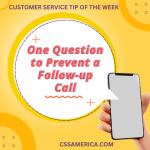
Facebook didn’t exist 15 years ago, and now companies provide customer service through it. Millennials weren’t a prevalent customer base 10 years ago, and now they dominate many companies’ customer service approach. In many industries, the customer experience wasn’t seen as vital to the bottom line 10 years ago (and still today to some), and now firms such as CSS are devoted exclusively to Improving Your Bottom Line by Improving Your Customer Service.
Time changes aspects of how we serve and who we serve. So the skills you have today – even if they’re a great fit for your company and customers – aren’t necessarily the skills needed tomorrow.
In order to continuously improve, therefore, we have to continuously learn.
That begs the question: How do you learn?
Here are several key practices to put in place to continuously learn:
- Identify Stars – Which of your co-workers is best in a certain aspect of what you do? Who has knowledge above others? Find the stars and ask how they are so good and how they stay at the top in performance, skills, or knowledge. If you don’t have someone like that in your organization, find tips, podcasts, or other resources from customer service experts that keep you leading edge.
- Look at Your Past – What have you done previously that led to success? The saying “those that don’t learn from the past are doomed to repeat it” was focused on failures of the past. But SUCCESS in the past does not guarantee repeat success. What did you do that satisfied that customer, resolved that issue, or retained that client business? Document the “why” behind that success to remember how to replicate it.
- Debate – Teams make better decisions when there is healthy conflict. They hash out perspectives, uncover ideas, and refine them under the pressure and questioning of debate. For you to tap into healthy conflict in a unique way to learn, identify some topics or types of customers that are challenging. Then talk with co-workers about different approaches for those situations, debating ideas and coming to a consensus on possible best practices. Debate your way to better performance.
- Measure Yourself – Learn from whatever metrics are important to you, your customer, and your company. Know what truly impacts those measures. Too often people think that hard work alone drives performance, but oftentimes knowing what you do well and focusing your energies on Strengthening Your Strength and avoiding situations where you’re not so skilled is what really moves the needle.
- Value Complaints – Our first reaction to complaints is often defensiveness, but in the midst of these complaining customers are sometimes nuggets. What can we learn from their complaint, or what drove the complaint, or what you tried to do to resolve it that didn’t calm them down or didn’t work? A complaint can be a gift.
- Ask Your Customers – What do they think of you, your process, your performance. Ask “How was the experience for you today?” or “Is there anything I could have done better or different in helping you today?” or “Is this the experience you were hoping for today?”
- Ask Your Clients – I know this sounds like the previous practice, but here I’m defining “client” as a long-term client who knows you fairly well professionally. State “I’m always looking for ways to improve, so I was wondering if you could offer me a little feedback – maybe one thing I do really well and one thing I could do better in some way.”
You may be great today, but remember that tomorrow is another day. Put practices in place to help you stay on the top of your game.
Hone your learning skills.
Signup for FREE Tips! Contact Us More Resources for You Visit Our Home Page























